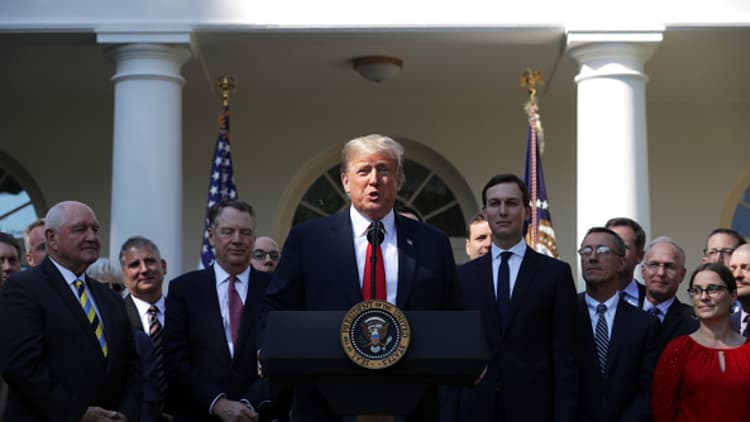
The new trilateral trade deal between the U.S., Canada and Mexico provides a validation of sorts for the bare-knuckle negotiating strategy that has won President Donald Trump so many critics.
As he sought to fulfill a key campaign promise to tear up multiple trade deals in which the U.S. participated, Trump used an approach derided as dangerous, protectionist brinkmanship that risked making the nation a pariah among not just traditional foes like China but also allies like Canada and the European Union.
With a new deal, though, comes a chance at bragging rights for an approach not seen from the White House in many administrations.
"This is another substantive win for the president," said Chris Garcia, former deputy director of the Commerce Department under Trump and now CEO of Vicar Financial. "This could be a real legacy piece for the president if all goes as planned. If anything can be taken away from the Trump presidency, it's really a shifting of the supply chain back to the North American continent and specifically to the United States."
Indeed, there are some key components that reorient commerce and provide some key protections the White House had sought.
Taken as whole, though, the new pact, called the U.S.-Mexico-Canada Agreement, looks a lot like the old North American Free Trade Agreement.
What's different are the optics, which show a president willing to get tough on global trading partners despite what the critics say and the risks such a strategy pose.
Prior administrations "weren't able to do it the diplomatic way, the old-school way," Garcia said. Trump "came in thinking outside the box. Some people thought he was a madman for wanting to slap tariffs on imports and threatening to increase tariffs progressively. I think those on the inside knew this was a means to an end. You've got to inflict real fear in the opposite party to get some substantive concessions, or they don't take it seriously."
In doing so, Trump scored political points with two key constituencies: farmers, who had been hurt by soybean duties and the dairy impasse with Canada, and union members, particularly those in the auto industries.
U.S. Chamber of Commerce President and CEO Thomas J. Donohue said the organization welcomed the "deal to modernize NAFTA" and wanted to "commend the negotiators for their commitment to finding a path forward that includes the U.S., Mexico and Canada."
Casey Guernsey, a spokesman for Americans for Farmers and Families, which backed Trump in the 2016 election, said the president "has not forgotten about his promise" to "stand up for rural America and make sure our voices were heard."
And Dean Garfield, president and CEO of the Information Technology Industry Council, called the announcement "a significant step toward creating a foundation for North America's economic prosperity for years to come."
Financial markets had largely been sanguine about the negotiations despite the occasionally alarming headlines indicating the U.S. was drifting into a global trade war. After news that the talks with Canada had beaten the Sept. 30 deadline that could have seen the U.S. and Mexico go it alone, Wall Street rallied.
There was enthusiasm that the pact, assuming all parties sign on, could serve as a global template.
'Great victory'
"Trump will portray the breakthrough with Canada as a great victory; this will put fresh pressure on China, which is facing a clear weakening of its manufacturing sector," Greg Valliere, chief global strategist at Horizon Investments, said in his morning note. "We think the U.S. and China will be back at the negotiating table later this fall, with signs of progress on market access for key American sectors such as financial services."
To be sure, doubts remain.
The guts of the USMCA look a lot like NAFTA, and the issues between the U.S. and China run deeper than with the North American partners.
"The US relationship with China is much more complicated than its relationship with Canada, and of course the stakes are considerably higher when dealing with China — the Chinese have leverage over the US that Canada simply doesn't have," Eric Winograd, senior economist at AB (formerly AllianceBernstein), said in a note.
"I certainly wouldn't rule out an agreement being reached with China, but I don't think that the US Mexico Canada Agreement provides a template that can be used in discussions with the Chinese," he added. "That's a separate negotiation that will need to proceed along its own course."
Trump, then, may need a mix of diplomacy and toughness to spread this weekend's success around the world.
"I think everybody wins," said Garcia, the former Commerce Department official. "It's a better deal than the previous one, that's for sure. What we see is the the fruits of hard bargaining on both sides."


